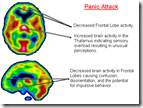
While experiencing a moment of fear and panic when faced with a dangerous situation is expected, panic attacks occur without the presence of a trigger or identifiable cause. Because of their random nature and the intensity of their symptoms, experiencing a panic attack can be terrifying. Many people feel as if they are having a heart attack or are dying when they experience their first panic attack.
Research has shown that South Asians express and experience panic attacks differently than other cultures. The most common symptoms that South Asians report when they experience a panic attack are:
Rapid heart rate
Excessive sweating
Shortness of breath or hyperventilation
Trembling
Additional symptoms of panic attacks that are seen less frequently amongst South Asians include:
Chills or hot flashes
Nausea
Abdominal cramping
Chest pain
Headache
Trouble swallowing
Symptoms rarely experienced by South Asians but are common to panic attacks are:
Dizziness
Faintness
Loss of balance
Fear of loss of control
Depersonalization
Panic attacks begin suddenly and without warning. They can occur anytime without any trigger, such as while doing the dishes, walking around the lake or driving to the grocery store. Symptoms tend to peak within 10 minutes or less and can last as long as half an hour. Because of the intense nature of the symptoms, it is very normal to feel fatigued or exhausted after a panic attack.
The most debilitating aspect of a panic attack is the fear that another one will occur. This can be so intense that it affects the way you live, for example you may begin to avoid situations and places that you associate with your previous panic attack. In the worst case, people may become afraid of leaving their home because it feels like the only safe place to be.
Experiencing 4 or more panic attacks in the span of one month or living in consistent fear of another panic attack may be an indication that you are living with panic disorder, a type of anxiety disorder. Because panic symptoms are so intense, they take a toll on your body. Having panic disorder has been shown to be a risk factor for experiencing a cardiac event.
Panic attacks can be rarely managed alone and require the intervention of a medical or mental health professional. Since panic attacks so closely resemble more serious medical issues, it is important to be evaluated as soon as possible by a medical professional. If the conclusion is that you experienced a panic attack, seek the help of a mental health professional such as a counselor of psychiatrist to manage the symptoms in the long run.
What do you think about this article? Please leave your comments below.
